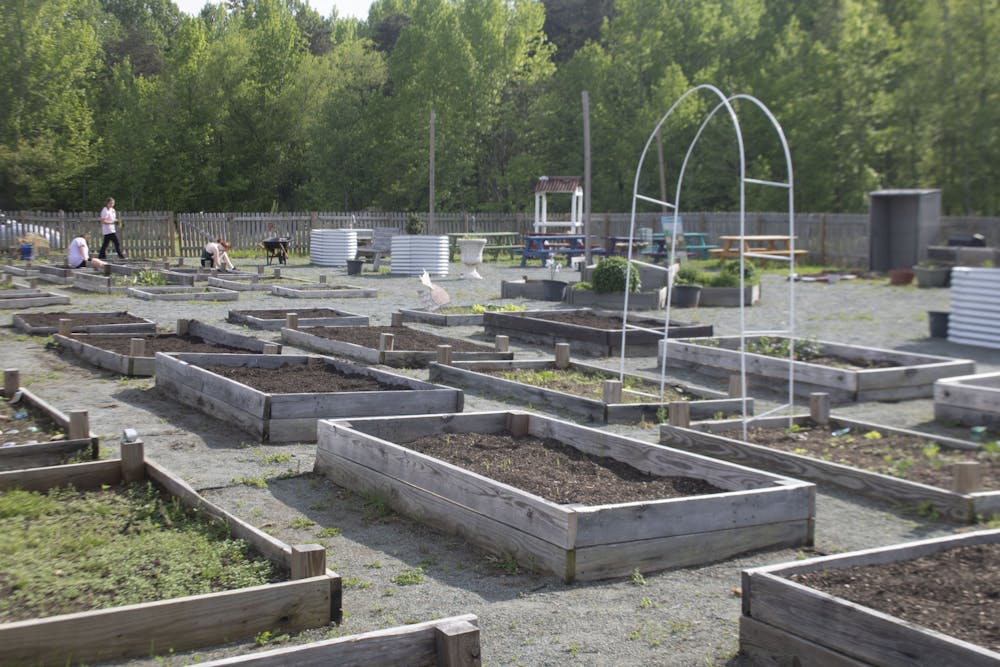Tucked behind Elon and Eastlawn Elementary are over 20 plant beds growing fruits and vegetables. In the gardens, the crops are ready for the peak spring season.
Created and maintained entirely by volunteers, many Elon University students are involved in the efforts that go into taking care of the space.
Elon sophomore Tori Layton is among them. She works as the school and community garden coordinator in the Elon School of Education’s Office of Environmental and Playspace Education.
“Our main mission with Garden Club is to get students out of a typical classroom environment,” Layton said. “Get them somewhere where they are encouraged to be messy, get dirty, run around and not just be stuck at a desk for several hours.”
Volunteers work with the elementary school Garden Club, an after-school program designed to bring the classroom outdoors. Both gardens work with the North Carolina School Garden Network, which connects schools from across the state with resources to build their own gardens. Elon Professor Scott Morrison is a founding member of the network and sees the gardens as extensions of the classroom.
“We have whiteboards and clipboards,” Morrison said. “We often have students do some drawing or writing about things that are around them in the garden.”

School and Community Garden Coordinator, Tori Layton, works to remove weeds and clovers growing around the garden on April 19.
The gardens thrive through support from the community, according to Morrison. The spaces are entirely funded by grants, whichLayton helps teachers at the schools apply for, including a grant from Kids Gardening.
Through these grants, the network created a community garden and two school gardens in the local area, as well as many other green spaces across the state.
The program also gets support from Elon’s Kernodle Center for Civic Life. Morrison said they provided the funding for the two schools to have a storage shed and permanent teaching materials in each of the outdoor classrooms. The materials allow teachers and students to learn in the garden even when Garden Club isn’t in session.
To Morrison, the easiest part of the project was building the gardens. But the difficulty comes in maintaining the spaces, especially in the summer when school is out. Summer is the peak season for agriculture, and while the students plant foods for the fall and spring, Layton said it’s difficult to find people to maintain the gardens between June and August.
“Over the summer, the weeds just grow because teachers aren't working and students aren't in school,” Layton said. “There's no one to take care of it and if someone doesn't want to take care of it or doesn't have the time to take care of it, the garden is just going to go to waste.”
However, during the school year, the gardens get plenty of use from teachers and students. Morrison also said the program could not be successful without the teachers involved in planning and facilitating the sessions.
In fact, the support from the community is so large, there is a waitlist for students interested in joining the club at both schools. Morrison said he wishes all the students could be involved, but there isn’t enough space or supplies.
“There's only so many beds and so many tools,” Morrison said. “Your infrastructure has to match the number of students that you have coming in, but we always have a waitlist for students who want to come.”
And while the gardens are places for students to learn about science, math and literacy, Morrison said they serve a deeper purpose.
“School gardens are complicated spaces,” Morrison said. “They don't exist out in a vacuum. They're political and they’re cultural.”
Elon students help with education in the garden but also serve as mentor figures for the students, stepping into a larger role than just volunteering. Layton said she sees Garden Club as a way to show children that there are all types of ways to learn.
“It's empowering to have an impact on a kid's life,” Layton said. “By going into these schools and being less of a power figure and more of a mentor allows for them to learn that they matter, and their experiences in education matter and they can learn on their own terms.”
Right now only Elon students can volunteer with the program, signing up through Phoenix Serve. However, Layton and Morrison hope to expand the volunteer efforts to the larger community soon by making the sign up available to the public.
“There's lots of ways to volunteer,” Morrison said. “Spending time outside, being in a garden and learning some new skills that you could even apply in your own life – I think it's a big win.”


